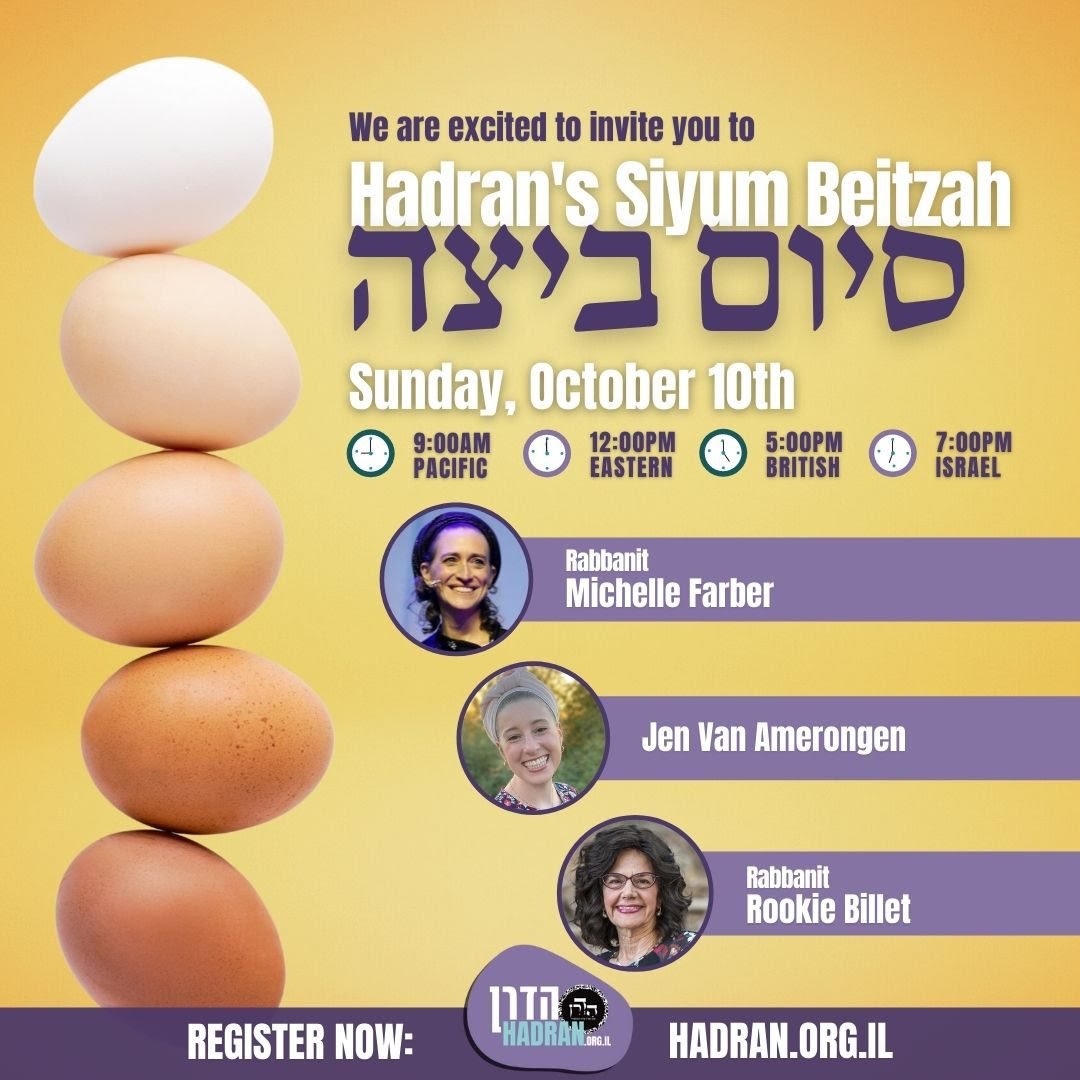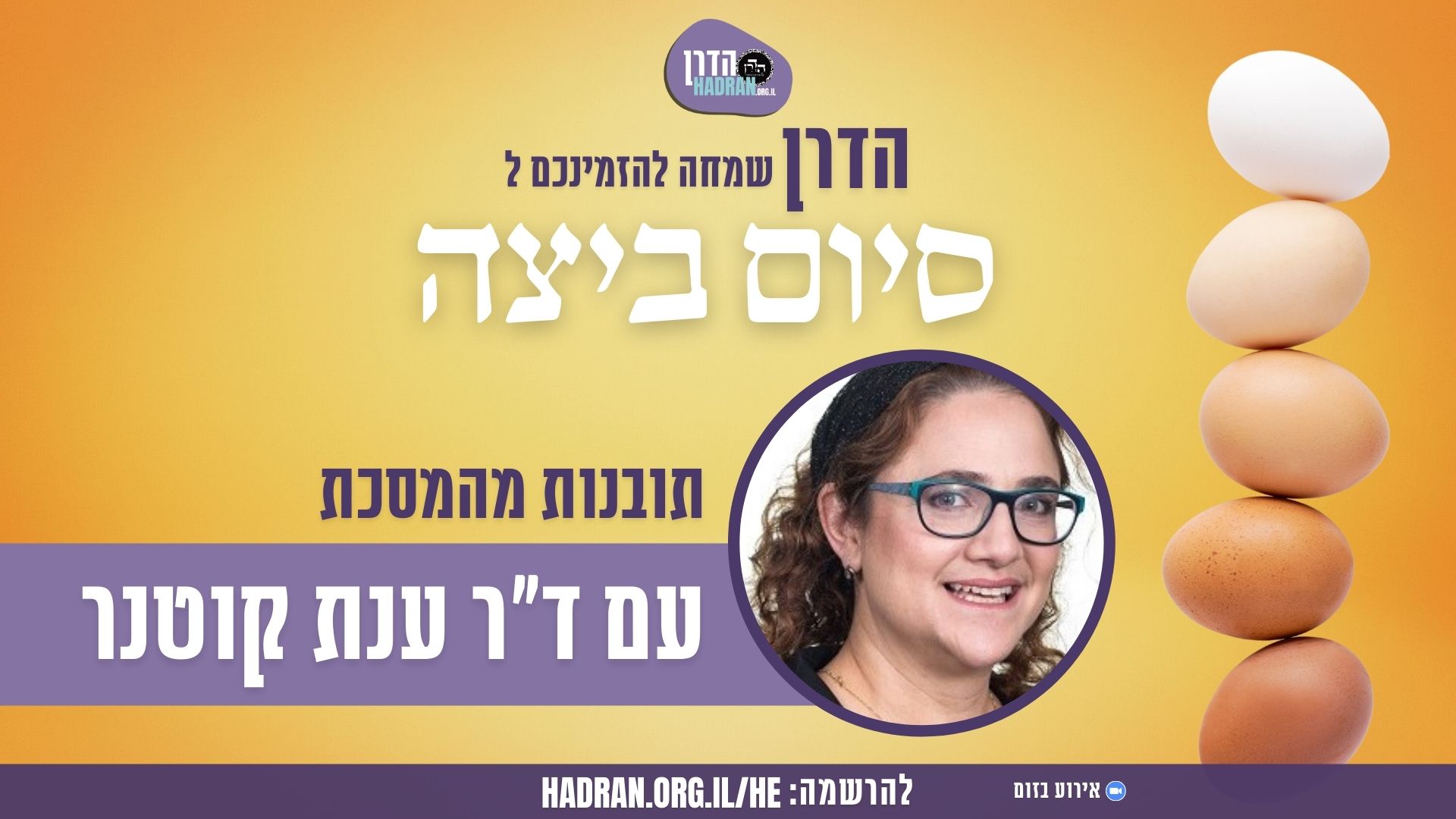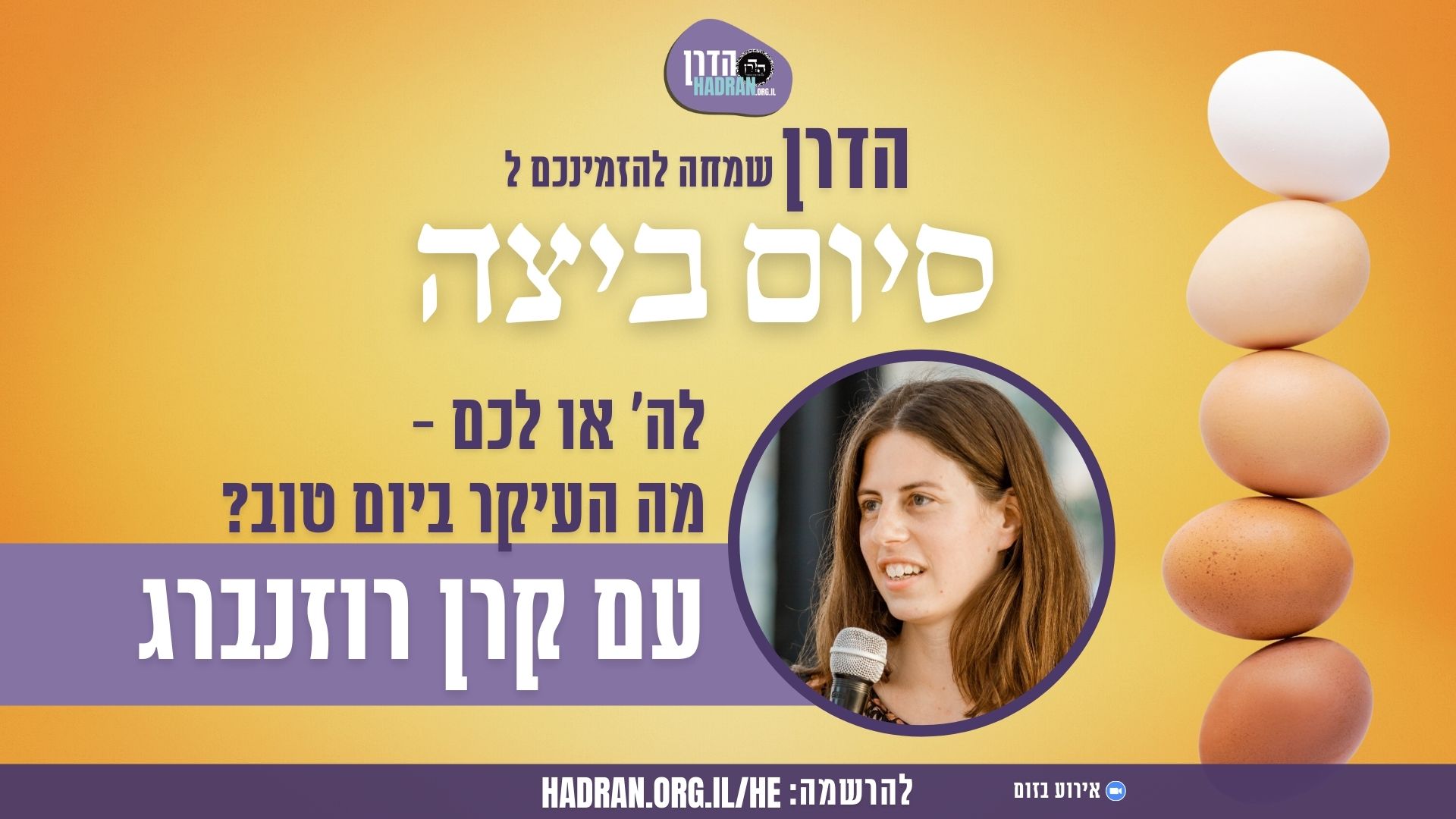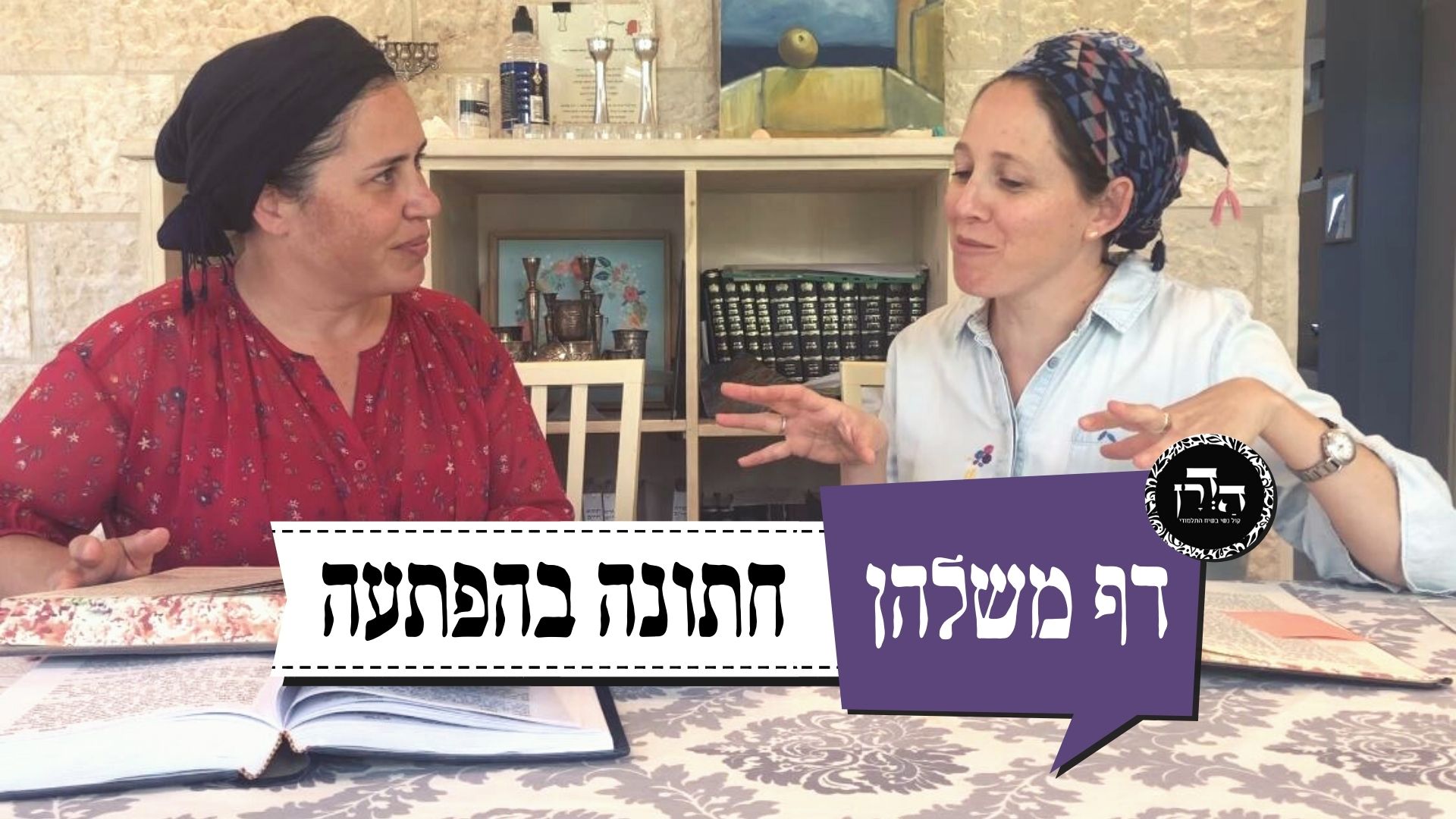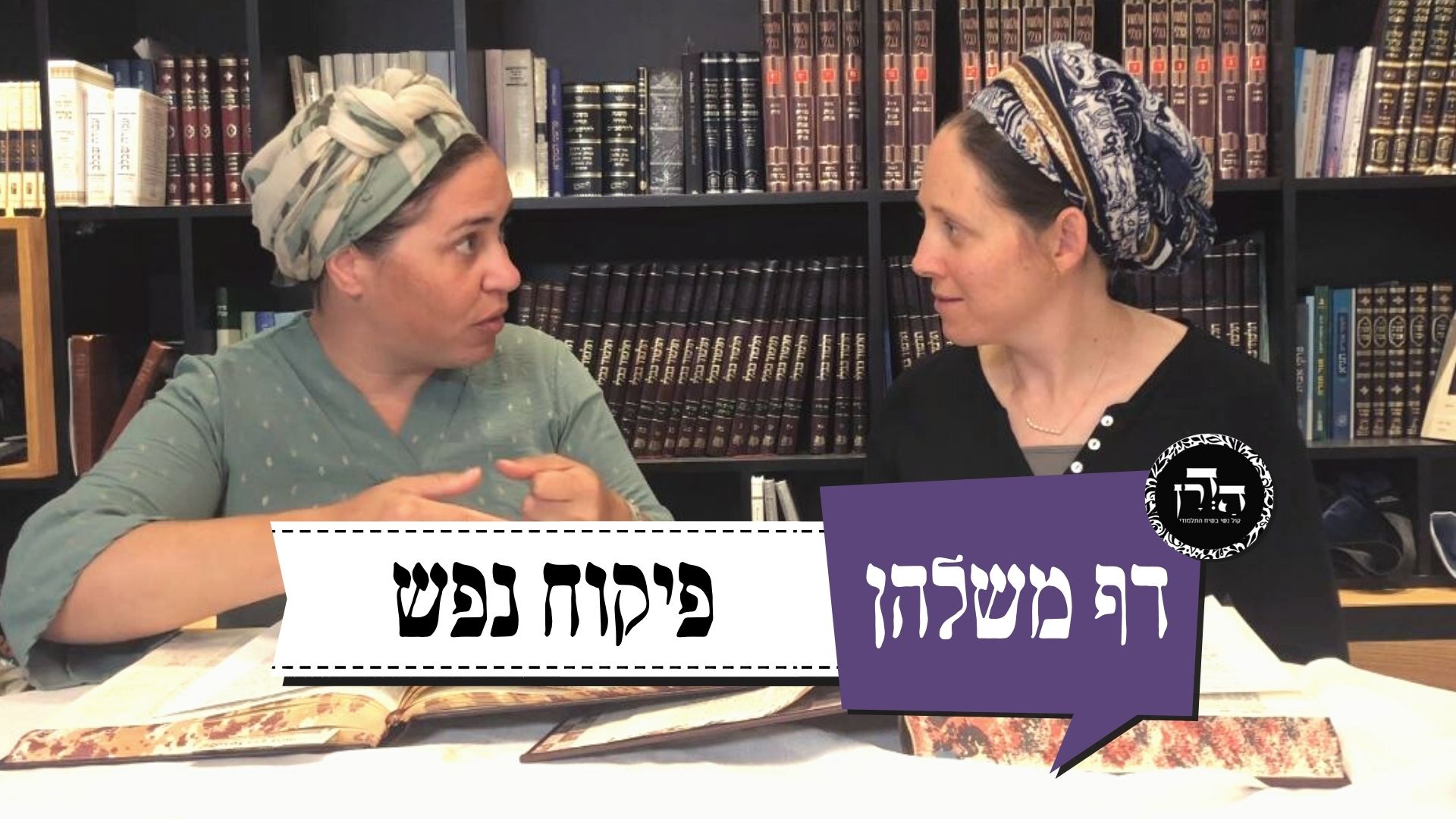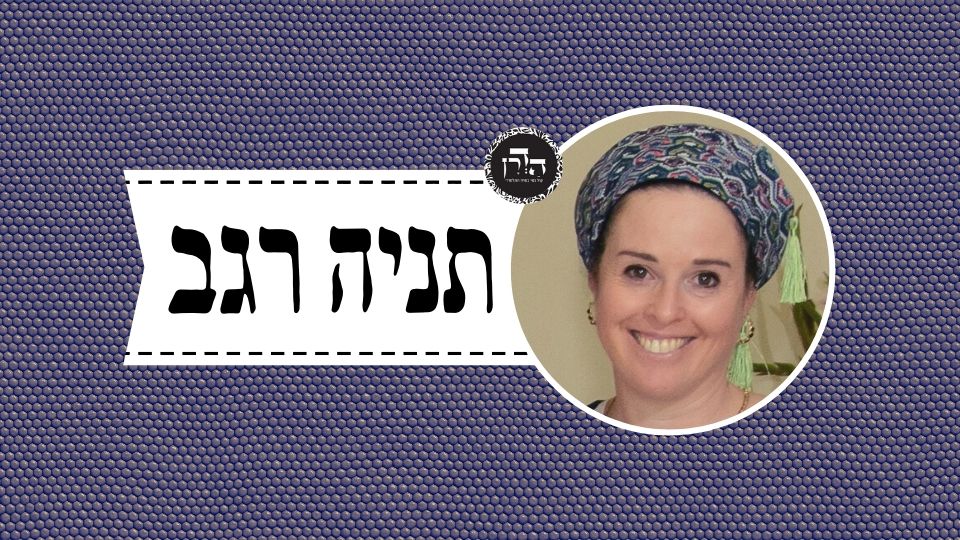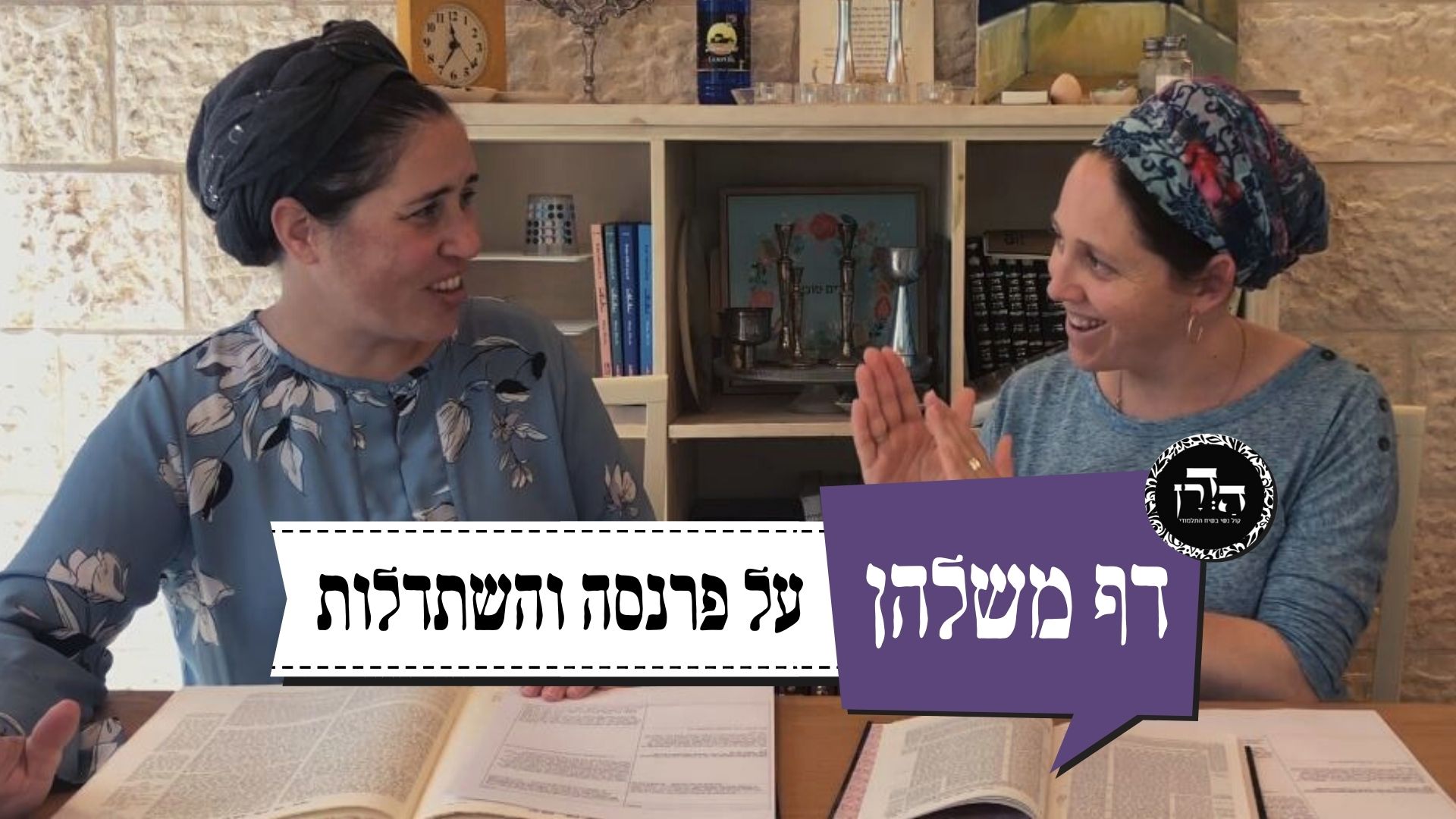ביצה יג
הָא רַבִּי, הָא רַבִּי יוֹסֵי בְּרַבִּי יְהוּדָה. דְּתַנְיָא: הִכְנִיס שִׁבֳּלִין לַעֲשׂוֹת מֵהֶן עִיסָּה — אוֹכֵל מֵהֶן עֲרַאי, וּפָטוּר.
This source, the baraita, is in accordance with the opinion of Rabbi Yehuda HaNasi, who holds that one must separate teruma from kernels of grain on the stalk, and one may separate terumot on a Festival. That source, the mishna, is in accordance with the opinion of Rabbi Yosei, son of Rabbi Yehuda, who maintains that there is no need to separate teruma from kernels of grain on the stalk, as it is taught in a baraita: If one brought inside his house stalks of grain in order to grind them into flour and to make dough from them, he may eat from them, as a snack, before they are ground, and he is exempt from teruma. Provided that the grain has not yet been fully processed, the obligation to separate teruma does not apply. The Sages decreed that such produce may only be consumed casually and not as part of a regular meal.
לְמוֹלְלָן בִּמְלִילוֹת — רַבִּי מְחַיֵּיב וְרַבִּי יוֹסֵי בְּרַבִּי יְהוּדָה פּוֹטֵר.
However, if from the outset one brought in the stalks of grain not to grind them but to husk the kernels and eat them a little at a time, Rabbi Yehuda HaNasi obligates him to separate teruma from them and prohibits him from partaking of the grain until he has done so. And Rabbi Yosei, son of Rabbi Yehuda, exempts him from the obligation of teruma. He maintains that not even this intention renders one obligated to separate teruma, as the obligation for teruma applies only to fully processed grain.
וּלְרַבִּי יוֹסֵי בְּרַבִּי יְהוּדָה נָמֵי מַשְׁכַּחַתְּ לַהּ — כְּגוֹן שֶׁהִכְנִיס שִׁבֳּלִין לַעֲשׂוֹת מֵהֶן עִיסָּה, וְנִמְלַךְ עֲלֵיהֶן לְמוֹלְלָן בְּיוֹם טוֹב, דְּטָבְלָא בְּיוֹמֵיהּ!
The Gemara challenges this: And according to the opinion of Rabbi Yosei, son of Rabbi Yehuda, you can also find a case when one must separate teruma from grain that has not been fully processed. How so? For example, if one brought inside his house stalks of grain to make dough from them, thereby rendering himself obligated to separate teruma from them, and he reconsidered and decided to husk them in order to eat the kernels on a Festival. In that case, the prohibition of untithed produce takes effect on that day and one is obligated to separate teruma, only afterward is he permitted to eat the kernels.
אֶלָּא: מַאי תְּרוּמָה — רוֹב תְּרוּמָה.
Rather, one must say: What is the teruma that Beit Shammai and Beit Hillel agree may not be separated on a Festival? It is referring to most teruma, e.g., grain that has been threshed and gathered into piles on the eve of the Festival. They do, however, admit that there are exceptional cases in which one may separate teruma on a Festival.
אָמַר אַבָּיֵי: מַחְלוֹקֶת בְּשִׁבֳּלִין. אֲבָל בְּקִטְנִיּוֹת — דִּבְרֵי הַכֹּל אִסּוּרְיָיתָא טָבְלָא.
Abaye said: This dispute, concerning when the obligation to separate teruma and the prohibition of untithed produce takes effect, is referring only to stalks of grain, which are typically brought into a granary, where they are processed in a standard manner. Until that point, the grain is not prohibited as untithed produce. However, with regard to legumes, everyone agrees that the bundles are already regarded as untithed produce, and teruma must be separated from them at that stage.
לֵימָא מְסַיַּיע לֵיהּ: מִי שֶׁהָיוּ לוֹ חֲבִילֵי תִלְתָּן שֶׁל טֶבֶל — הֲרֵי זֶה כּוֹתֵשׁ, וּמְחַשֵּׁב כַּמָּה זֶרַע יֵשׁ בָּהֶם, וּמַפְרִישׁ עַל הַזֶּרַע וְאֵינוֹ מַפְרִישׁ עַל הָעֵץ. מַאי לָאו — רַבִּי יוֹסֵי בְּרַבִּי יְהוּדָה הִיא, דְּאָמַר: הָתָם לָא טָבְלָא הָכָא טָבְלָא!
The Gemara suggests: Let us say that the following mishna supports him (Terumot 10:6): With regard to one who had bundles of fenugreek, a type of legume, of untithed produce, he may pound these bundles to remove the seeds from them. And he calculates how many seeds the bundles contain and separates teruma based on the quantity of seeds, but he does not calculate and separate teruma based on the quantity of stalks. Although the stalks and leaves are also used for cooking, it is not necessary to separate teruma from them. What, is it not the case that this halakha is in accordance with the opinion of Rabbi Yosei, son of Rabbi Yehuda, who said: There, with regard to stalks of grain, it is not yet ready to be tithed, and therefore not prohibited as untithed produce, whereas here, i.e., with regard to the bundles of fenugreek, it is ready to be tithed and therefore prohibited as untithed produce?
לָא, רַבִּי הִיא. אִי רַבִּי הִיא, מַאי אִירְיָא תִּלְתָּן, אֲפִילּוּ שִׁבֳּלִין נָמֵי?
The Gemara rejects this contention: No, this is no proof, as it can be claimed that the mishna dealing with fenugreek is in accordance with the opinion of Rabbi Yehuda HaNasi, who obligates one to separate teruma in the case of stalks of grain. The Gemara challenges this: If it is in accordance with the opinion of Rabbi Yehuda HaNasi, what novel element does the mishna provide? Why specifically discuss fenugreek? According to Rabbi Yehuda HaNasi, the same halakha applies even to stalks of grain as well.
אֶלָּא מַאי, רַבִּי יוֹסֵי בְּרַבִּי יְהוּדָה — לַשְׁמְעִינַן שְׁאָר מִינֵי קִטְנִיּוֹת, וְכׇל שֶׁכֵּן תִּלְתָּן.
The Gemara rejects this: Rather, what then? Is the mishna in accordance with the opinion of Rabbi Yosei, son of Rabbi Yehuda? If so, let him teach us this halakha with regard to other types of legumes, i.e., that they have the status of untithed produce when placed in bundles. And all the more so this would apply to fenugreek, which is eaten only in small quantities and is not processed in the manner of grain.
אֶלָּא תִּלְתָּן אִצְטְרִיכָא לֵיהּ. סָלְקָא דַּעְתָּךְ אָמֵינָא: הוֹאִיל וְטַעַם עֵצוֹ וּפִרְיוֹ שָׁוֶה, לִפְרוֹשׁ נָמֵי אַעֵצוֹ, קָא מַשְׁמַע לַן.
Rather, it cannot be proven that the mishna follows either the opinion of Rabbi Yosei, son of Rabbi Yehuda, or that of Rabbi Yehuda HaNasi, as it was necessary for the tanna to state the case of fenugreek for a different reason: It could enter your mind to say: Since in the case of fenugreek the taste of its stalk and its fruit are identical, as the branches of the fenugreek add flavor to a dish, perhaps one should also separate teruma based on the quantity of fenugreek stalks, as well. The tanna of the mishna therefore teaches us that there is no obligation to do so, and this is the novel element of his statement.
אִיכָּא דְּאָמְרִי, אָמַר אַבָּיֵי: מַחְלוֹקֶת בְּשִׁבֳּלִין, אֲבָל בְּקִטְנִיּוֹת דִּבְרֵי הַכֹּל אִסּוּרְיָיתָא לָא טָבְלָא. מֵיתִיבִי: מִי שֶׁהָיוּ לוֹ חֲבִילֵי תִלְתָּן שֶׁל טֶבֶל הֲרֵי זֶה כּוֹתֵשׁ, וּמְחַשֵּׁב כַּמָּה זֶרַע יֵשׁ בָּהֶן, וּמַפְרִישׁ עַל הַזֶּרַע וְאֵינוֹ מַפְרִישׁ עַל הָעֵץ. מַאי לָאו, טֶבֶל טָבוּל שֶׁל תְּרוּמָה!
Some say that Abaye said the following: This dispute between Rabbi Yosei, son of Rabbi Yehuda, and Rabbi Yehuda HaNasi is referring to stalks of grain; however, with regard to legumes, everyone agrees that the bundles are not yet ready to be tithed and are therefore not prohibited as untithed produce. The Gemara raises an objection to this: With regard to one who had bundles of fenugreek of untithed produce, he may pound them and calculate how many seeds they contain and separate teruma based on the quantity of seeds, but he does not separate based on the quantity of stalks. What, is this not referring to the normal case of untithed produce of teruma, i.e., produce from which the regular teruma, the initial portion taken from produce as the priests’ portion, must be separated?
לָא, טֶבֶל טָבוּל שֶׁל תְּרוּמַת מַעֲשֵׂר.
The Gemara rejects this: No, it is referring to a different case, that of first tithe that is still regarded as untithed produce, because of teruma of the tithe that must still be separated from it. First tithe is given to the Levites, who must separate ten percent as teruma of the tithe, to give to the priests. Before teruma of the tithe is separated, the first tithe may not be eaten.
וְכִדְרַבִּי אֲבָהוּ אָמַר רַבִּי שִׁמְעוֹן בֶּן לָקִישׁ. דְּאָמַר רַבִּי אֲבָהוּ אָמַר רַבִּי שִׁמְעוֹן בֶּן לָקִישׁ: מַעֲשֵׂר רִאשׁוֹן שֶׁהִקְדִּימוֹ בְּשִׁבֳּלִין,
And this statement is in accordance with the opinion that Rabbi Abbahu said that Rabbi Shimon ben Lakish said, as Rabbi Abbahu said that Rabbi Shimon ben Lakish said: It can occur that a Levite might take the first tithe before the teruma is separated, while the grain is still on the stalks. The correct procedure is: After collecting the grain in a pile in the granary, one first separates teruma, and only afterward separates first tithe to give to the Levites.
שְׁמוֹ טוֹבְלוֹ לִתְרוּמַת מַעֲשֵׂר.
If this order was not followed, and the first tithe was separated first while the grain was still attached to the stalks, Rabbi Shimon ben Lakish maintains that the following halakha applies: Its name, i.e., the fact that it has been designated first tithe, renders it ready to be tithed and therefore prohibited as untithed produce, as pertains to teruma of the tithe that must still be separated from it. This shows that there can be a separation of a type of teruma, specifically the teruma of the tithe, even before work on the produce has been completed, and this is the case to which the previously quoted mishna is referring.
כּוֹתֵשׁ לְמָה לִי? לֵימָא לֵיהּ: כִּי הֵיכִי דִּיהַבוּ לִי, הָכִי יָהֵיבְנָא לָךְ! אֲמַר רָבָא: קְנָסָא.
The Gemara challenges this interpretation: If first tithe is considered untithed produce when it is named, why do I need the act of pounding? Let the Levite say to the priest: As they gave to me stalks of grain, or unprepared bundles, so I am giving them to you in the same state. Rava said: It is a penalty. In other words, the Levite should indeed be entitled to issue this claim; however, as he acted improperly by taking his tithe prematurely, the Sages decreed that he may not separate the priest’s portion in its current state, but must first improve it.
תַּנְיָא נָמֵי הָכִי: בֶּן לֵוִי שֶׁנָּתְנוּ לוֹ שִׁבֳּלִין בְּמַעַשְׂרוֹתָיו — עוֹשֶׂה אוֹתָן גּוֹרֶן, עֲנָבִים — עוֹשֶׂה אוֹתָן יַיִן, זֵיתִים — עוֹשֶׂה אוֹתָן שֶׁמֶן, וּמַפְרִישׁ עֲלֵיהֶם תְּרוּמַת מַעֲשֵׂר, וְנוֹתְנָן לַכֹּהֵן. שֶׁכְּשֵׁם שֶׁתְּרוּמָה גְּדוֹלָה אֵינָהּ נִיטֶּלֶת
The Gemara comments: That opinion is also taught in a baraita. With regard to a Levite who was given stalks of grain as his tithes, he renders them into a granary, i.e., he must thresh and process them in the usual manner. Similarly, if he was given grapes, he renders them wine; if he was given olives, he renders them oil; and afterward he separates teruma of the tithe for them and gives them to a priest. For just as teruma gedola, i.e., standard teruma, is not separated from unprocessed produce,
אֶלָּא מִן הַגּוֹרֶן וּמִן הַיֶּקֶב, כָּךְ תְּרוּמַת מַעֲשֵׂר אֵינָהּ נִיטֶּלֶת אֶלָּא מִן הַגּוֹרֶן וּמִן הַיֶּקֶב.
but only from the granary and the winepress, so too, teruma of the tithe is separated only from the granary and the winepress.
מְחַשֵּׁב? הָא מְדִידָה בָּעֵי!
The Gemara asks: If the mishna is referring to produce from which teruma gedola has not been separated, it is appropriate to use the term: Calculates. However, according to the suggestion that it is referring to a first tithe, from which teruma of the tithe must be separated, why does the mishna state: Calculates? The tanna of the mishna should have said: Measures. The amount of teruma gedola to be separated is calculated by estimation, as there is no fixed amount for this teruma according to Torah law. With regard to the teruma separated from first tithe, however, the Torah established the fixed amount of one-tenth, and one is required to measure precisely.
הָא מַנִּי אַבָּא אֶלְעָזָר בֶּן גִּימֶל הִיא, דְּתַנְיָא: אַבָּא אֶלְעָזָר בֶּן גִּימֶל אוֹמֵר: ״וְנֶחְשַׁב לָכֶם תְּרוּמַתְכֶם״ — בִּשְׁתֵּי תְרוּמוֹת הַכָּתוּב מְדַבֵּר, אַחַת תְּרוּמָה גְּדוֹלָה וְאַחַת תְּרוּמַת מַעֲשֵׂר. כְּשֵׁם שֶׁתְּרוּמָה גְּדוֹלָה נִיטֶּלֶת בְּאוֹמֶד וּבְמַחְשָׁבָה — כָּךְ תְּרוּמַת מַעֲשֵׂר נִיטֶּלֶת בְּאוֹמֶד וּבְמַחְשָׁבָה.
The Gemara explains: In accordance with whose opinion is this mishna? It is in accordance with the opinion of Abba Elazar ben Gimmel, as it is taught in a baraita: Abba Elazar ben Gimmel says: The verse states: “And your teruma shall be reckoned to you as though it were the corn of the granary and as the fullness of the winepress” (Numbers 18:27). The verse speaks of two terumot. One is teruma gedola, and the other one is teruma of the tithe. Just as teruma gedola is separated by estimation and is not measured exactly, and it is enough to separate it by thought, as the word “reckoned” implies that the mere intention to separate a particular portion serves to remove the rest of the produce from its untithed state, so too, teruma of the tithe can also be separated by estimation and by thought.
גּוּפָא, אָמַר רַבִּי אֲבָהוּ אָמַר רַבִּי שִׁמְעוֹן בֶּן לָקִישׁ: מַעֲשֵׂר רִאשׁוֹן שֶׁהִקְדִּימוֹ בְּשִׁבֳּלִין — שְׁמוֹ טוֹבְלוֹ לִתְרוּמַת מַעֲשֵׂר. מַאי טַעְמָא? אָמַר רָבָא: הוֹאִיל וְיָצָא עָלָיו שֵׁם מַעֲשֵׂר.
§ Since it was mentioned incidentally, the Gemara discusses the matter itself: Rabbi Abbahu said that Rabbi Shimon ben Lakish said: With regard to first tithe, in a case in which the Levite preceded the priest while the grain was still on the stalks, its name renders it untithed produce, until he separates from it the teruma of the tithe. The Gemara asks: What is the reason for this halakha? Rava said: Since the name of the first tithe was called upon it, the obligation of the teruma of the tithe takes effect as well.
אָמַר רַבִּי שִׁמְעוֹן בֶּן לָקִישׁ: מַעֲשֵׂר רִאשׁוֹן שֶׁהִקְדִּימוֹ בְּשִׁבֳּלִין — פָּטוּר מִתְּרוּמָה גְּדוֹלָה.
The Gemara cites a similar halakha that Rabbi Shimon ben Lakish said: With regard to first tithe, in a case in which the Levite preceded the priest while the grain was still on the stalks, before it was threshed and turned into a pile, the owner separated first tithe before teruma. In that case, the separated tithe is exempt from teruma gedola. Although teruma gedola should have been separated from the produce first, and it should have included some of the produce taken as the first tithe, the Levite is nevertheless exempt from separating this teruma.
שֶׁנֶּאֱמַר: ״וַהֲרֵמוֹתֶם מִמֶּנּוּ תְּרוּמַת ה׳ מַעֲשֵׂר מִן הַמַּעֲשֵׂר״, מַעֲשֵׂר מִן הַמַּעֲשֵׂר אָמַרְתִּי לְךָ, וְלֹא תְּרוּמָה גְּדוֹלָה וּתְרוּמַת מַעֲשֵׂר מִן הַמַּעֲשֵׂר.
This is because it is stated: “And you shall set apart from it a teruma for the Lord, even a tenth part of the tithe” (Numbers 18:26), which indicates: A tenth part of the tithe, i.e., the teruma of the tithe, I, God, said to you that you must separate it, and you are not obligated in both teruma gedola and teruma of the tithe from the first tithe.
אֲמַר לֵיהּ רַב פָּפָּא לְאַבָּיֵי: אִי הָכִי, אֲפִילּוּ הִקְדִּימוֹ בִּכְרִי נָמֵי! אֲמַר לֵיהּ: עָלֶיךָ אָמַר קְרָא: ״מִכֹּל (מַעְשְׂרוֹתֵיכֶם) תָּרִימוּ אֵת כׇּל תְּרוּמַת ה׳״.
Rav Pappa said to Abaye: If so, if there is a source for this halakha in the Torah, even if the Levite preceded the priest, i.e., first tithe was separated after the grain had been threshed and the kernels of grain placed in a pile, then it should also be exempt from teruma gedola. Abaye said to Rav Pappa: With regard to your claim, the verse states: “From all that is given you, you shall set apart that which is the Lord’s teruma” (Numbers 18:29). This verse indicates that God’s teruma, i.e., teruma gedola, must be taken from all the produce, including the tithe.
וּמָה רָאִיתָ? הַאי אִדְּגַן, וְהַאי לָא אִדְּגַן.
The Gemara asks: And what did you see that led you to require the separation of teruma gedola from first tithe that was taken from processed grain piled in the granary but not from first tithe that was taken from grain on stalks? Abaye answers: This, grain that has been threshed and placed into piles, is completely processed and has become grain, and that, grain that remains on the stalk, has not yet become grain. Until the grain is threshed and assembled in a pile, the obligation to separate teruma does not take effect, as it is not considered grain. When such unprocessed grain is designated first tithe, it ceases to be untithed produce and the opportunity to separate teruma from it has been missed. However, once the grain has been processed, and the obligation to separate teruma has taken effect, it is as if the teruma is already mixed in, and the obligation to separate it cannot be overridden by the fact that this produce has been designated first tithe.
תְּנַן הָתָם: הַמְקַלֵּף שְׂעוֹרִין, מְקַלֵּף אַחַת אַחַת וְאוֹכֵל. וְאִם קִלֵּף וְנָתַן לְתוֹךְ יָדוֹ — חַיָּיב. אָמַר רַבִּי אֶלְעָזָר: וְכֵן לְשַׁבָּת.
§ We learned in a mishna there (Ma’asrot 4:5): One who peels grains of barley to eat them raw may peel them one by one and eat them immediately without tithing them, as this is considered a casual manner of eating. But if he peeled and placed several of them into his hand, he is obligated to separate tithes. Rabbi Elazar said: And a similar halakha applies to Shabbat. Peeling grains of barley one by one is not considered threshing, and it is permitted; if a whole handful of grains are peeled together, this does constitute the prohibited labor of threshing.
אִינִי? וְהָא רַב מְקַלְּפָא לֵיהּ דְּבֵיתְהוּ כָּסֵי כָּסֵי! וְרַבִּי חִיָּיא מְקַלְּפָא לֵיהּ דְּבֵיתְהוּ כָּסֵי כָּסֵי! אֶלָּא אִי אִתְּמַר, אַסֵּיפָא אִתְּמַר: הַמּוֹלֵל מְלִילוֹת שֶׁל חִטִּים, מְנַפֵּחַ עַל יָד עַל יָד וְאוֹכֵל. וְאִם נִפַּח וְנָתַן לְתוֹךְ חֵיקוֹ — חַיָּיב. אָמַר רַבִּי אֶלְעָזָר: וְכֵן לְשַׁבָּת.
The Gemara asks: Is that so? But didn’t Rav’s wife peel for him barley on Shabbat by the cupful? And likewise Rabbi Ḥiyya’s wife would peel barley for him on Shabbat by the cupful. Rather, if Rabbi Elazar’s comment was stated in this context, it was stated with regard to the latter clause of that same mishna (Ma’asrot 4:5): With regard to one who husks kernels of wheat by hand, he may blow onto the chaff to disperse it a little at a time and eat the kernels without separating tithes. But if he blows on the kernels and puts a large amount of them into his lap, he is obligated to separate tithes from the food. It was with regard to this teaching that Rabbi Elazar said: And a similar halakha applies to Shabbat.
מַתְקֵיף לַהּ רַבִּי אַבָּא בַּר מֶמֶל: וְרֵישָׁא, לְמַעֲשֵׂר אִין לְשַׁבָּת לָא? וּמִי אִיכָּא מִידֵּי דִּלְעִנְיַן שַׁבָּת לָא הָוֵי גְּמַר מְלָאכָה, וּלְמַעֲשֵׂר הָוֵי גְּמַר מְלָאכָה?
Rabbi Abba bar Memel strongly objects to this: And with regard to the first clause of the mishna, one should conclude: Yes, if one peeled a handful of barley, it is considered prepared with regard to tithes, but no, it is not considered threshing with regard to Shabbat? But is there anything that, with regard to Shabbat, is not considered the completion of the labor and may be performed; and yet, with regard to tithes, it is considered the completion of the labor? Isn’t the prohibition against work on Shabbat far more stringent than tithes in all its details?
מַתְקֵיף לַהּ רַב שֵׁשֶׁת בְּרֵיהּ דְּרַב אִידִי: וְלָא, וְהָא גׇּרְנָן לְמַעֲשֵׂר, דִּתְנַן: אֵיזֶהוּ גׇּרְנָן לְמַעֲשֵׂר? הַקִּשּׁוּאִין וְהַדִּלּוּעִין — מִשֶּׁיְּפַקְּסוּ. וְשֶׁלֹּא פִּקְּסוּ — מִשֶּׁיַּעֲמִיד עֲרֵמָה. וּתְנַן נָמֵי גַּבֵּי בְצָלִים — מִשֶּׁיַּעֲמִיד עֲרֵמָה. וְאֵלּוּ גַּבֵּי שַׁבָּת — הַעֲמָדַת עֲרֵמָה פָּטוּר.
Rav Sheshet, son of Rav Idi, strongly objects to this claim: And is there no example of a halakha in which tithes are treated more stringently than Shabbat? And is there not the halakha of their granary for tithes, as we learned in a mishna (Ma’asrot 1:5): What is the equivalent of their granary, i.e., the point at which the processing of various vegetables is completed so that they become obligated in tithes? With regard to cucumbers and gourds, they become obligated from when one trims the thin hairs that cover them [misheyefaksu], and for those he did not trim, from when he assembles them in a pile. And we also learned in a mishna (Ma’asrot 1:6), with regard to onions, that it is from when one assembles them in a pile. Whereas with regard to Shabbat, one who assembles produce in a pile is exempt, as this is not a prohibited labor on Shabbat.
אֶלָּא מַאי אִית לָךְ לְמֵימַר: מְלֶאכֶת מַחְשֶׁבֶת אָסְרָה תּוֹרָה, הָכָא נָמֵי: מְלֶאכֶת מַחְשֶׁבֶת אָסְרָה תּוֹרָה.
Rather, what have you to say? Why is one exempt if he forms a pile on Shabbat? The Torah prohibited only planned, constructive labor on Shabbat, the type of work that involves the creation of something new, and the formation of a pile is not considered that kind of labor. Here too, with regard to peeling barley, the Torah prohibited creative work. Although collecting the peeled barley in one’s hand is considered the completion of the labor in respect to tithes, it is not prohibited labor on Shabbat.
כֵּיצַד מוֹלֵל? אַבָּיֵי מִשְּׁמֵיהּ דְּרַב יוֹסֵף אָמַר: חֲדָא אַחֲדָא. וְרַב אַוְיָא מִשְּׁמֵיהּ דְּרַב יוֹסֵף אָמַר: חֲדָא אַתַּרְתֵּי. רָבָא אָמַר: כֵּיוָן דִּמְשַׁנֵּי — אֲפִילּוּ חֲדָא אַכּוּלְּהוּ נָמֵי.
Apropos husking kernels on Shabbat, the Gemara asks: How may one husk grain on a Festival? Abaye said in the name of Rav Yosef: One finger on another, i.e., one may place the kernels between two fingers and rub. And Rav Avya said in the name of Rav Yosef: One may even do so one on two, i.e., between the thumb and two fingers. Rava said: Since he alters the manner in which he performs the activity, he may even do so with one finger on all the rest.
כֵּיצַד מְנַפֵּחַ? אָמַר רַב אַדָּא בַּר אַהֲבָה אָמַר רַב: מְנַפֵּחַ
The Gemara further asks: How may one blow on the grain, to winnow it in a permitted manner on Shabbat? Rav Adda bar Ahava said that Rav said: One blows

